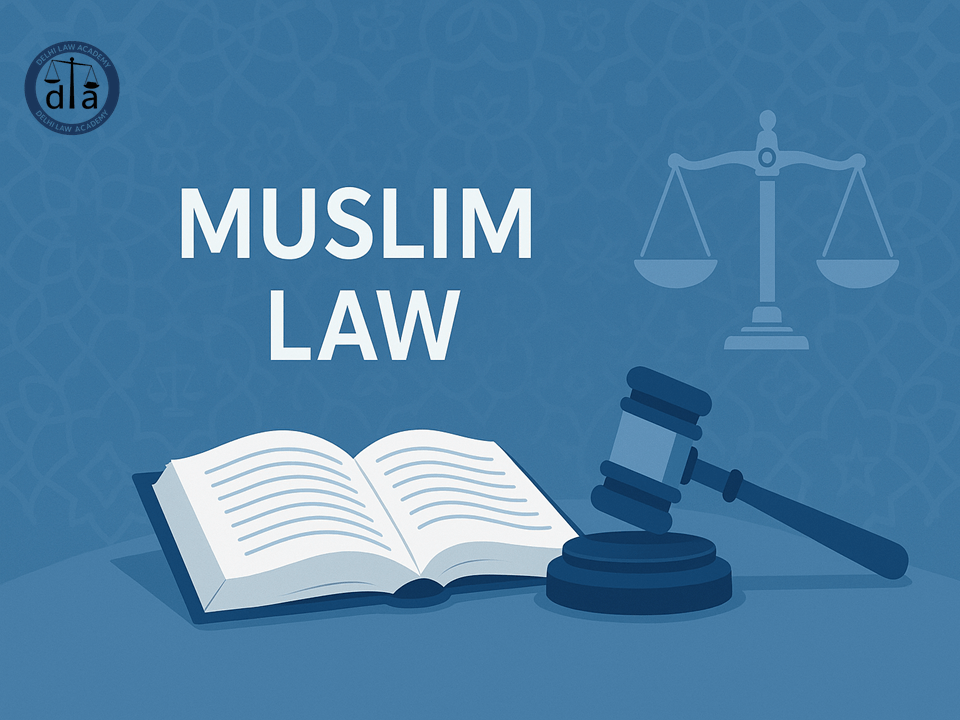
⚖️ Preparation for RJS, DJS, PCS (J) and Other Judicial Service Exams
Does the Muslim Personal Law Impose No Obligation Upon the Husband to Provide for the Maintenance of His Divorced Wife?
MOHD. AHMED KHAN v. SHAH BANO BEGUM [1985 SC]
- Section 125 overrides the personal law, if there is any conflict between the two.
- The conclusion that the right conferred by section 125 can be exercised irrespective of the personal law of the parties is fortified, especially in regard to Muslims, by the provision contained in the Explanation to the second proviso to section 125(3) of the Code.
📚 Muslim Law is an important component of most Judicial Service exams in the country. Its thorough knowledge is a must for all aspirants of RJS, DJS, PCS (J) and other Judicial Service exams. To help such aspirants, DELHI LAW ACADEMY JAIPUR has launched a series of study material modules on all important aspects of this important part of their syllabus:
MOHD. AHMED KHAN v. SHAH BANO BEGUM [1985 SC]
Bench strength: 5
This appeal, arising out of an appellation filed by a divorced Muslim woman for maintenance under section 125 of the Code of Criminal Procedure, raises a straightforward issue which is of common interest not only to Muslim women, not only to women generally but, to all those who, aspiring to create an equal society of men and women, lure themselves into the belief that mankind has achieved a remarkable degree of progress in that direction.
The appellant, who is an advocate by profession, was married to the respondent in 1932. Three sons and two daughters were born of that marriage. In 1975, the appellant drove the respondent out of the matrimonial home. In April 1978, the respondent filed a petition against the appellant under section 125 of the Code asking for maintenance at the rate of Rs 500 per month. On November 6, 1978 the appellant divorced the respondent by an irrevocable talaq.
His defence to the respondent’s petition for maintenance was that she had ceased to be his wife by reason of the divorce granted by him, to provide that he was therefore under no obligation maintenance for her, that he had already paid maintenance to her at the rate of Rs. 200 per month for about two years and that, he had deposited a sum of Rs. 3000 in the court by way of dower during the period the of iddat.
In August, 1979 the learned Magistrate directed appellant to pay a princely sum of Rs. 25 per month to the respondent by way of maintenance. It may be mentioned that the respondent had alleged that the appellant earns a professional income of about Rs. 60,000 per year. In July, 1980, in a revisional application filed by the respondent, the High Court of Madhya Pradesh enhanced the amount of maintenance to Rs. 179.20 per month. The husband is before us by special leave.
Does the Muslim Personal Law impose no obligation upon the husband to provide for the maintenance of his divorced wife?
Undoubtedly, the Muslim husband enjoys the privilege of being able to discard his wife whenever he chooses to do so, for reasons good, bad or indifferent. Indeed, for no reason at all. But, is the only price of that privilege the dole of a pittance during the period of iddat? Then again, is there any provision in the Muslim Personal Law under which a sum is payable to the wife ‘on divorce’?
Under section 125(1)(a), a person who, having sufficient means, neglects or refuses to maintain his wife who is unable to maintain herself, can be asked by the court to pay a monthly maintenance to her at a rate not exceeding Five Hundred rupees. By clause (b) of the Explanation to section 125(1), ‘wife’ includes a divorced woman who has not remarried. These provisions are too clear and precise to admit of any doubt or refinement. The religion professed by a spouse or by the spouses has no place in the scheme of these provisions. Whether the spouses are Hindus or Muslims, Christians or Parsis, pagans or heathens, is wholly irrelevant in the application of these provisions.
The induction of the definition of ‘wife’, so as to include a divorced woman lends even greater weight to that conclusion. ‘Wife’ means a wife as defined, irrespective of the religion professed by her or by her husband. Therefore, a divorced Muslim woman, so long as she has not remarried, is a ‘wife’ for the purpose of section 125. The statutory right available to her under that section is unaffected by the provisions of the personal law applicable to her.
The conclusion that the right conferred by section 125 can be exercised irrespective of the personal law of the parties is fortified, especially in regard to Muslims, by the provision contained in the Explanation to the second proviso to section 125(3) of the Code. That proviso says that if the husband offers to maintain his wife on condition that she should live with him, and she refuses to live with him, the Magistrate may consider any grounds of refusal stated by her, and may make an order of maintenance notwithstanding the offer of the husband, if he is satisfied that there is a just ground for passing such an order. According to the Explanation to the proviso:
“If a husband has contracted marriage with another woman or keeps a mistress, it shall be considered to be just ground for his wife’s refusal to live with him.”
It is too well-known that “A Mahomedan may have as many as four wives at the same time but not more. If he marries a fifth wife when he has already four, the marriage is not void, but merely irregular”. The explanation confers upon the wife the right to refuse to live with her husband if he contracts another marriage, leave alone 3 or 4 other marriages. It shows, unmistakably, that section 125 overrides the personal law, if there is any conflict between the two.
One must have regard to the entire conspectus of the Muslim Personal Law in order to determine the extent both, in quantum and induration, of the husband’s liability to provide for the maintenance of an indigent wife who has been divorced by him. Under that law, the husband is bound to pay Mahr to the wife as a mark of respect to her. True, that he may settle any amount he likes by way of dower upon his wife, which cannot be less than 10 Dirhams, which is equivalent to three or four rupees.
We are concerned to find whether Mahr is an amount payable by the husband to the wife on divorce. Some confusion is caused by the fact that, under the Muslim Personal Law, the amount of Mahr is usually split into two parts, one of which is called “prompt”, which is payable on demand, and the other is called “deferred”, which is payable on the dissolution of the marriage by death or by divorce. But, the fact that deferred Mahr is payable at the time of the dissolution of marriage, cannot justify the conclusion that it is payable ‘on divorce’.
For these reasons, we dismiss the appeal.
📚 Continue Your Muslim Law Preparation
Don’t stop here! Strengthen your knowledge of Muslim Law with our blogs:
📘 Free Study Material for Judiciary Aspirants!
Download our FREE study material prepared by Delhi Law Academy’s expert faculty.
The key issue was whether a Muslim husband is legally bound to provide maintenance to his divorced wife under Section 125 of the CrPC, even if Muslim Personal Law says otherwise. The Supreme Court ruled that Section 125 overrides personal law in case of conflict.
✅ Yes. Section 125 applies to all, regardless of religion. It clearly defines ‘wife’ to include a divorced woman who has not remarried. Hence, Muslim women can claim maintenance even after divorce.
Mahr is a financial obligation paid by the husband to the wife as a mark of respect. It may be prompt (payable on demand) or deferred (payable upon death or divorce). However, the Court held that Mahr is not a substitute for post-divorce maintenance.
The judgment reinforced the idea that constitutional law and criminal procedure take precedence over personal laws when it comes to protecting fundamental rights, especially women’s rights to maintenance and dignity.
Yes, it remains valid. However, the Court clarified that statutory provisions like Section 125 CrPC override it in case of conflict, especially regarding maintenance for divorced women.
Muslim Law is a vital subject in RJS, DJS, PCS(J), and other Judicial Service exams. Candidates are expected to know key principles, landmark cases like Shah Bano, and how personal laws interact with constitutional and criminal laws.
Contact us
📍 Delhi Law Academy – Jaipur Branch
6C, Tower 2, Coaching Hub, Pratap Nagar, Jaipur – 302033
📞 Phone:
+91 9911916552
+91 8447285606
✉️ Email:
contactus@delhilawacademy.com

